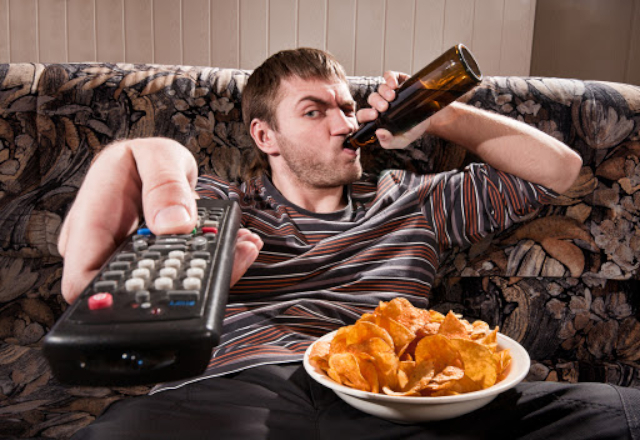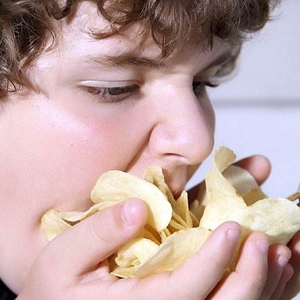Today, I present a pair of new scientific studies that confirm what many of us have been suspecting: the COVID-19 lock down lifestyle has been contributing to a weight-gain trend among social distancers over the past few months. And we need to be aware of this to counteract it…
 Homo Couchpotatoensis: A whole new human evolutionary
Homo Couchpotatoensis: A whole new human evolutionary
stage? Measures mandated to fight COVID-19 may be
exacerbating the continuing global obesity crisis…
Screen time addicts unaware they’re over-snacking
Here’s one that I was sure Dr. Obvious would have flagged for us – unless, of course he’s been binge watching Suits reruns or trying to find out what happens after you become a Gold Grand Master in Microsoft Solitaire.
UK researchers at the University of Sussex wanted to see of there was a disconnect between task and environment when people engaged in tasks that were perceptually demanding – like intensive screen gaming or binge-watching TV.
What they did
So, they devised an experiment in which they observed a group of study subjects snacking while engaged in a low-perceptual demand task and gave them first a low-Calorie beverage and then a high-Calorie beverage, and observed their behaviour.
According to an abstract of the Study Repoort: “One-hundred and twenty participants consumed either a low-satiety (75 Cal) or high-satiety (272 Cal and thicker texture) drink while simultaneously completing a task which was either low or high in perceptual demand.”
What they found
The participants who were given the low perceptual load task, and were given the high-satiety drink felt more full and ate 45 percent less of the snack offered to them afterwards. However, the participants who were given the higher load perception task were less able to tell when they felt full, and ate more of the snacks offered to them. The researchers conclude that a person’s ability to notice when the body feels full depends on how much available attention there is ‘left’ in the brain.”
The takeaway
Dr. Martin Yeomans from the University of Sussex, said: “Our study suggests that if you’re eating or drinking while your attention is distracted by a highly engaging task, you’re less likely to be able to tell how full you feel. You’re more likely to keep snacking than if you’d been eating while doing something less engaging. This is important for anyone wanting to stay a healthy weight.”
Lock down lifestyle may cause obesity ‘explosion’
Researchers from the University of Copenhagen (UoC) in Denmark say that the hallmark emotional and social effects of the COVID-19 lock down trigger an explosion in the obesity epidemic already ravaging modern society.
Prologue
“Emotional stress, economic anxiety, physical inactivity and social distance – [caused by] locking down society to combat COVID-19 – creates psychosocial insecurity that leads to obesity,” says a letter from a trio of UoC researchers, published in the scientific journal Nature Reviews Endocrinology.
Observations
An abstract of the letter observes that: Firstly, it is well documented that people with limited economic resources are more likely eat highly-processed and energy-rich food. These foods have been shown to stimulate people’s appetites, so that they end up eating more calories than they need.
Secondly, physical distancing increases anxiety by limiting our ability to socially interact. Feelings of loneliness and isolation, combined with confinement within a home setting, can impact our food behavior and lead us to overeat. This effect is compounded by lower levels of physical activity, as people are urged to work from home and venture out as little as possible.
The takeaway
More research is needed to uncover the cause and effect, but the three co-authors say the scientific expectations are clear: physical distancing and rising rates of unemployment should lead us to expect increased rates of obesity.
Together they urge governments and decision makers to consider what impact COVID-19 containment strategies, such as lock downs, will have on the public’s metabolic health. With this in mind, counter strategies should be considered to ensure that the public remains healthy, happy and active — and also safe from the coronavirus.
My take
It all makes sense to anyone who is accustomed to applying common sense to daily problem-solving challenges. But how ironic is it that the very measures being recommended, or even mandated to beat COVID-19 are priming the obesity epidemic for a global explosion?
~ Maggie J.

